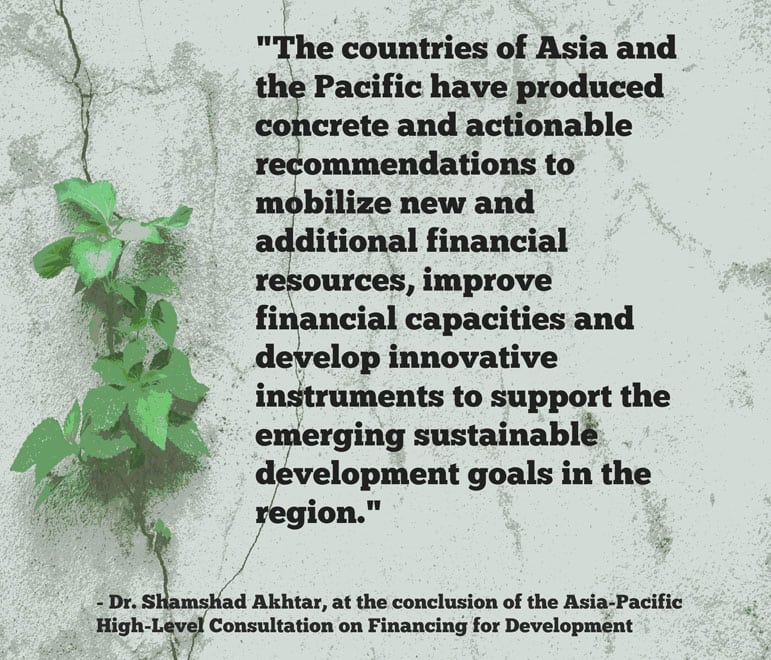Asia-Pacific policymakers, together with business and civil society representatives from around 40 countries in the region, today agreed to a landmark financing strategy to mobilize the region’s financial resources for inclusive and sustainable growth.
The new regional action plan, endorsed at a high-level consultation in Jakarta and organized by the United Nations Economic and Social Commission for Asia and the Pacific (ESCAP) and the Government of Indonesia, outlines ways to mobilize new and additional financial resources to transform the regional development landscape.
“The countries of Asia and the Pacific have produced concrete and actionable recommendations to mobilize new and additional financial resources, improve financial capacities and develop innovative instruments to support the emerging sustainable development goals in the region,” said ESCAP Executive Secretary, Dr. Shamshad Akhtar, at the conclusion of the two-day Asia-Pacific High-Level Consultation on Financing for Development.
The strategy focuses on countries that are among the poorest in the world, as well as nations challenged by their geographical location, and aims to unleash large-scale job creation, and to bridge deep and widespread socioeconomic inequalities along gender and urban-rural and geographical lines.
[tweetthis url=”http://wp.me/p5Mdaw-1db”]Asia-Pacific countries agree to harness financial resources to accelerate sustainable development #action2015 #ffd3[/tweetthis]
Estimates of the potential financial resources that could be tapped for sustainable development in the region include $218 billion in remittances, $492 billion in foreign direct investment and $4 trillion in fiscal revenues per year. The region has another $6 trillion in private savings. In addition, the stock of financial assets of the region’s most wealthy individuals amounted to $35 trillion in 2013.
“The consultation has been very successful in forming a foundation for our national, regional and international initiatives to identify options and strategies for resource mobilization in achieving the sustainable development goals expected to be adopted by world leaders later this year, to succeed the Millennium Development Goals,” said the Indonesian Finance Minister, Bambang PS. Brodjonegoro.
The regional action plan will also guide global deliberations leading up to the Third International Conference on Financing for Development, to be held in Addis Ababa, Ethiopia in July this year. Participants noted that the financing strategies agreed today in Jakarta, will help to implement the ambitious and transformative new global development agenda in the Asia-Pacific region.
Among the key priorities identified by the action plan are:
- The urgent need to invest in social sectors to reduce social disparities and income inequalities, including those between genders
- Making financial markets more effective and efficient to channel the vast pool of regional savings for infrastructure development
- Mainstreaming climate considerations into national budgets and setting up institutional and risk management frameworks for private investors towards climate mitigation and adaptation.
- Addressing the special needs of least developed countries, landlocked developing countries and small island developing states, by leveraging trade, foreign direct investment, transfers of technology and capacity-building while ensuring that unmet official development assistance commitments are fulfilled.
Source: UN Economic and Social Commission for Asia and the Pacific

